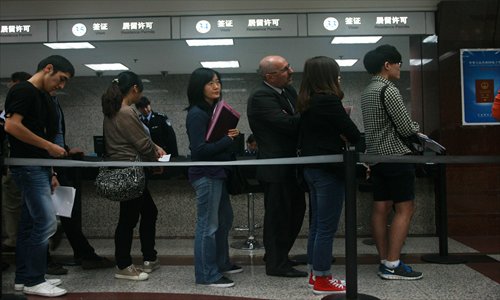Backdoor into China

Visa renewal can be a source of frustration for foreigners in China, but it's an essential process to avoid being targeted in sporadic crackdowns by police on illegal aliens. The exact number of expats without valid visas in China is unknown, however more than 20,000 illegal foreigners were dealt with nationwide in 2011, according to the Ministry of Public Security.
Most job-seeking expats enter the country on either a tourist (L) or business (F) visa before finding work.
But for those unfortunate enough to find themselves stranded with an expired visa, loopholes can be exploited to avoid harsh fines and possible deportation.
Bribing border guards
Richard (pseudonym), 28, found himself living every foreigner's nightmare when he overstayed his F visa by one year in 2010.
"I searched online and found an agent who said he could help people in my situation," said the American, who spoke on condition of anonymity. "All I needed to do was take a bus to the Mongolian border, meet with him, bribe [border] guards and enter Mongolia. I could come back easily, they said, with no black mark in my passport."
Faced with the prospect of possible jail time and being blacklisted from China, he took an overnight bus from Beijing to Erenhot, a Gobi Desert border town in the Inner Mongolia Autonomous Region.
Richard arrived at the agreed meeting place on time, but his contact was a no-show. Instead, a man "with scars all over his face" approached him on behalf of the agent. The first question asked of Richard was straight to the point: how much cash was he carrying?
"I told him and he said it wasn't enough. He said that things were different and the situation had changed," he recalled.
Richard phoned his ex-girlfriend and asked her to wire him enough cash to pay the 10,000 yuan ($1,608) needed to secure his passage into Ulan Bator. He then timed his crossing to coincide with a patrol of border guards "willing to be bribed," he said.
"They let me cross and made sure no black mark was stamped in my passport. My advice? Don't let your visa expire," he said wryly.
Under-the-table agencies
Several agencies, all touting their services online, offer to renew expired visas for foreigners. Using their services is a gamble for foreigners, who normally are required to part with tens of thousands of yuan and their passport.
One such agency is ilaowai, a company based in Guangzhou, Guangdong Province. The company's vision outlined on its website claims it is "strongly committed to the social and economic welfare" of foreigners by providing "invaluable" visa solutions.
Tim Wu, who founded ilaowai eight years ago, told Metro Beijing his company "negotiates deals with the government" for visa overstayers. He candidly admits his business thrives in a legally gray area.
"It is a loophole, there are many in China. There are many channels available. What we do is choose the best one," he said.
However, the company is notorious among some expats in Beijing as a scam.
Metro Beijing spoke with ilaowai visa agent Winnie Tam to find out how much it would cost to renew an F visa that expired one month ago. Tam said the first step would be to go to a public security bureau in Shenzhen, Guangdong Province, to pay a fine of 9,800 yuan.
"We would accompany you there. [The police] are sympathetic with our work needs," said Tam. "We then arrange for a one-year, multiple entry F visa for a total cost of 7,000 yuan. We contact [the client] when the visa is ready."
Solution or scam?
Steve Trent, a 33-year-old Australian, formerly worked as an ilaowai visa agent. He said the penalty for overstaying a visa by more than two years included a fine of at least 10,000 yuan. Offenders are also required to pen a letter of apology to authorities before being blacklisted from China for life.
Trent left ilaowai in October last year, ending a five-month employment stint he described as a "terrible experience."
"My job was to basically convince people to use [ilaowai's] services. It's a legitimate company, but to charge that amount of money to foreigners was, in my opinion, unethical," he told Metro Beijing.
Alex Williams, a 26-year-old American, is another former visa agent for ilaowai who similarly left on bitter terms in August last year. He described the company as "a glorified middleman."
"From what I could tell, it seemed like ilaowai really doesn't do much at all. Their main channel is a guy in Hong Kong who supplies visas," he said.
Williams noted visa renewal fees depended on the customer's nationality and how long they had overstayed. After that, it just "depended on the money."
"Some of these [visa renewal] companies don't have the purest intentions. It's really a case of 'buyer beware.' You get what you're promised, but pay way more for it," he noted.
Trent recalled one incident involving a French national who needed his visa renewed. When payment was due, he asked for an extension of a couple of days because his salary had yet to be deposited into his bank account.
"I said it was fine, but when my boss [Wu] found out, he called the guy and actually threatened him if he didn't pay up immediately," Trent recalled, noting such intimidation tactics are common. "That really made my blood boil. I was disgusted and left soon after."
Wu was upfront when confronted by claims his business threatened clients slow to pay up.
"There are a lot of situations where [clients] pay the deposit, only to say to me, 'I don't have money to pay.' If everyone was like that we would go broke," he said. "Normally, we talk to them and scare them, telling them if they don't pay we have to charge interest. This is a business of trust. When people hand over their passports and money, you have to be."
Tom Fearon contributed to this story